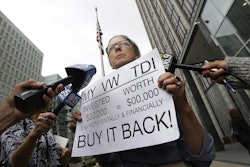NEW YORK (AP) — Law enforcement groups say they fear the public will stop aiding police authorities if Apple is allowed to refuse to give up information from a phone in a New York City drug case.
The groups filed arguments in Brooklyn federal court Thursday in support of government efforts to reverse a magistrate judge's ruling earlier this year for Apple. A district judge has yet to rule on the appeal.
The government pressed on with the Brooklyn case even after dropping its fight to compel Apple to help it break into an iPhone used by a gunman in a December attack in San Bernardino, California, that killed 14 people. It's using the routine drug case to test the boundaries of a 227-year-old law it says gives officials wide authority to force businesses to help criminal probes.
The Federal Law Enforcement Officers Association, the Association of Prosecutor Attorneys and the District Attorneys Association of the State of New York said Apple was setting a dangerous precedent by challenging centuries-old expectations that members of the public will assist law enforcement.
"If Apple were to prevail in this court, the public at large may think twice about cooperating with law enforcement when called upon to do so, invalidating centuries of well-settled law and common practice. Second, Apple's refusal to provide assistance, if validated by this court, will have far-reaching public safety ramifications by giving criminals a safe haven to conduct their unlawful activities," the groups said.
The Cupertino, California-based Apple said in papers filed last week that the government's request was extraordinary because there was likely minimal evidentiary value of any data on the phone, that Congress never authorized it to pursue such requests through the 1789 All Writs Act and there is no proof Apple's assistance is necessary.
The company said it "strongly supports, and will continue to support, the efforts of law enforcement in pursuing criminals," but not through the government's misuse of a law it wants to use as a "precedent to lodge future, more onerous requests for Apple's assistance."
In their submission, the law enforcement organizations cited the importance of quickly getting information from telephones to aid law enforcement, particularly in terrorism cases.
They cited published reports that a cellphone led law enforcement after the November Paris terrorist attacks to quickly find the alleged ringleader, who later died in a police raid.
"To be clear: if the court adopts Apple's reasoning, public safety will suffer," the groups said. "Crimes will go unsolved and criminals will go free. Apple's iPhones and iPads are ubiquitous. They are powerful and are growing more powerful with each new generation."






















